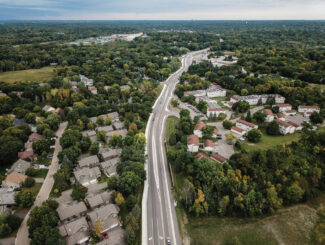June 12, 2023
By John Gerlach, Vice President of Oil & Gas, WSB
Recently, Minnesota signed new legislation requiring the state to achieve net zero emissions by 2040. This significant step toward sustainability presents challenges and opportunities for cities throughout the state. Here’s what this means for cities and how to navigate the transition into the future.
Understanding the Footprint
The net zero emissions legislation signed by the governor of Minnesota presents cities with a unique opportunity to transform their energy infrastructure and contribute to a sustainable future. Achieving a net zero carbon footprint requires a comprehensive approach. Cities must allocate acreage and land for renewable energy projects. They must consider the financial implications, technology requirements, security considerations, and materials. By initiating the planning process early, cities can develop robust design, construction, and management strategies.
Cities also need to consider the differences between paying for and owning energy supply. Like the difference between playing for a football team versus owning the football team, owning sustainable energy infrastructure allows cities to exert greater control over their energy sources and costs.
Funding Opportunities and Sustainable Energy Solutions
Implementing net zero emissions laws brings significant financial opportunities for cities. Given the availability of state and federal funding, tax credits, and incentive programs, cities should prioritize grant writing as a crucial step in securing financial support for their net initiatives. This requires expertise and dedicated staff who can navigate the grant application process effectively. Hiring individuals with experience in securing renewable energy grants can significantly enhance a city’s chances of success.
Integrating into Existing Infrastructure
Integrating net zero emissions into already-existing infrastructure is a critical aspect of the transition. Technology plays a crucial role in accomplishing this feat. While renewable energy sources will increasingly contribute to the energy mix, it is essential to acknowledge the continued importance of pipelines for efficient energy transportation. By repurposing existing infrastructure, such as methane gas pipelines from landfills into natural gas systems, cities can make significant strides toward achieving their emissions goals.
How WSB Can Help the Transition to Net Zero
WSB is committed to helping cities in Minnesota navigate the transition to a net zero future. We offer expertise in identifying renewable energy solutions that suit each city’s unique requirements. Our services encompass sustainable energy infrastructure design, construction, and management. Leveraging WSB’s experience, knowledge, and resources will help cities achieve their net zero goals.
John has over 25 years of pipeline construction experience. He leads our Pipeline Field Staff and manages natural gas inspection teams throughout the United States. While operating out of our St Paul, MN office, his activities include business development, team development to ensure our team meets pipeline compliance and standards, implementation of training programs, Operator Qualification and pipeline related certifications as well as overseeing the day to day field operations.
[email protected] | 612.214.1260


